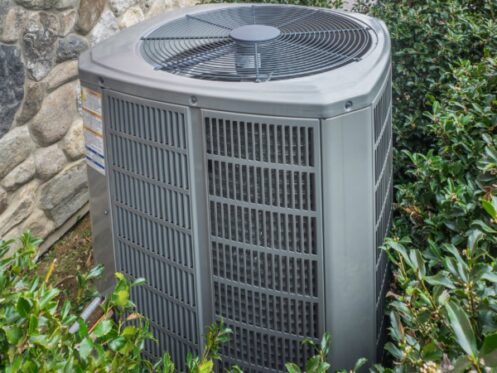Updated March 7th, 2024
Now is a great time to start thinking about upgrading your HVAC system as thanks to the federal government you may be eligible for both a tax credit and a rebate on your new HVAC unit. The new tax credits are part of the Inflation Reduction Act of 2022. While this act was primarily designed to lessen the impact of inflation, it also included provisions that are meant to help combat climate change.
One of these provisions is that new high-efficiency electric heat pumps as well as some air conditioners, gas furnaces, and other HVAC units automatically qualify for a credit that you can apply against your next year’s taxes, and this credit can help you save quite a bit of money on your new unit. Here is everything you need to know about these new tax credits and other rebates you may be eligible for.
The Energy Efficient Home Improvement Tax Credit
The Inflation Reduction Act included a renewal and update for the previous Nonbusiness Energy Tax Credit. Known as the Energy Efficient Home Improvement Tax Credit, this program allows you to earn a tax credit of up to $3,200 a year. The program started on January 1, 2023, and will run until December 31, 2032, which means you may be eligible if you upgrade or replace any HVAC unit within the next decade.
Homeowners can qualify for a tax credit worth up to $1,200 a year for installing high-efficiency air conditioners or furnaces and also for making certain other upgrades to improve their home’s energy efficiency, such as adding insulation or replacing windows and doors. The total amount you can claim in a year is $1,200, but there are some limitations. For instance, the total tax credit cannot exceed more than 30% of the total cost of your new HVAC units or any other upgrades you make. New high-efficiency furnaces and air conditioners are also capped at 30% or up to $600.
There is also a separate tax credit for anyone who installs any new electric heat pump, biomass boiler, or heat pump water heater. While this is also capped at 30% of the cost of purchasing and installing your new unit, you can potentially claim a total tax credit of up to $2,000 for these units.
One important thing to note is that not all new units will qualify as there are certain restrictions on which heat pumps, furnaces, and central air conditioners qualify for these tax credits. Only ENERGY STAR-certified units are eligible for the tax credit, and even then, not all ENERGY STAR units qualify. The only exception is for packaged air conditioners as any ENERGY STAR unit will qualify.
For gas furnaces to qualify under the new program, the unit must be ENERGY STAR certified with an annual fuel utilization efficiency (AFUE) above 97%. For a split air conditioner, it must have a seasonal energy efficiency ratio (SEER2) of 17 or higher. For a heat pump to qualify, it must be at least 18 SEER and have a heating seasonal performance factor (HSPF) of at least 10.
It is also important to note that the minimum AFUE and SEER2 ratings are only for the current year and may increase in the future. This is because the specific wording in the tax code states that units only qualify for the tax credit if they “meet or exceed the highest efficiency tier (not including any advanced tier) established by the Consortium for Energy Efficiency which is in effect as of the beginning of the calendar year.”
These energy efficiency tiers are regularly updated and the requirements to qualify for the highest tier often increase each year. As a result, a unit that is currently in this year’s highest tier may not qualify next year when the requirements change. This is part of the reason why we would recommend replacing your old unit sooner rather than later as you may end up paying quite a bit more for a qualifying unit if you wait and the requirements increase.
2022 Tax Credits
If you had a new HVAC unit installed anytime in 2022, you may also be eligible to apply for a retroactive tax credit. While this tax credit isn’t nearly as large as the 2023 credit, it can still give you some money back. Depending on the specific unit that was installed, you could be eligible for a total credit of either $300 or $500 on qualifying heat pumps, air conditioners, furnaces, and water heaters.
The High-Efficiency Electric Home Rebate Act
The Inflation Reduction Act also established the new High-Efficiency Electric Home Rebate Act, which entitles some homeowners to a rebate worth up to $8,000 on the cost of a new electric heat pump. The program also provides separate rebates for other appliances. For instance, heat pump clothes dryers and induction stoves may qualify for a rebate of up to $840, while heat pump water heaters can be eligible for a rebate of up to $1,750.
This rebate program is quite a bit different than the tax credit program for a few reasons. The first is that the U.S. federal government has set aside a total of $4.4 billion in funds that will then be distributed to each state. Each state is then responsible for creating and managing its own rebate program and distributing the funds to those who qualify. Each state only receives a percentage of the total funds based on its population, and the rebate program will automatically stop as soon as all of a state’s funds have been distributed.
Although the program was approved and the money set aside for it in 2022, the rebates won’t be available until sometime in 2024 as each state must still create its own program and have it approved by the federal government before the funds will be made available. Californians will be able to start applying this year. To speed this process up, the federal government has set a deadline of August 2024. If any state does not start distributing the rebates by this point, this will automatically forfeit their funds.
Another difference is that this rebate program is only available to some families based on their total yearly income. The program is available to anyone who earns no more than 150% of the median income in their area, but there are limits on what percentage of the total rebate a family is eligible for based on their income. Families that earn 80% or less of the median income in their area are eligible for the full rebate worth up to $8,000 on any new heat pump. Families that earn between 80 and 150% of the median income are only eligible for half the total or $4,000.
One great thing about this program is that the rebate is available at the time of the purchase, which means you don’t have to wait to get your money back as you do with the tax credits. Another major advantage is that all new heat pump units qualify as there are no energy efficiency requirements.
If you’re looking to upgrade or replace any HVAC unit, Allbritten is here to help. We install air conditioners, heat pumps, furnaces, and other heating and cooling equipment, and our team can also assist with any HVAC repairs and maintenance or plumbing services you may need. For more information or to schedule any heating, cooling, or plumbing service in the Fresno area, give us a call today.


